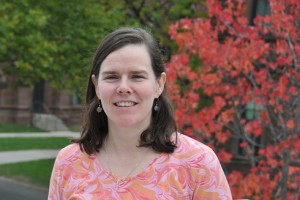Fellowship Takes Haddad to Japan for Research on Environmental Politics

Although Japan lacks large national environmental advocacy organizations, it has one of the best records of environmental policymaking in the world. Japan is one of the top producers of clean energy technology and hosted the global Kyoto Protocol that has set the standard for climate change policy worldwide.
For the next 12 months, Mary Alice Haddad will use Japan’s experience of environmental activism to build a broader theory of civic participation. She will test and refine a theory through the examination of environmental politics and civic participation in China, Korea, Thailand, Taiwan and Singapore.
Her research is supported by the Abe Fellowship Program. Haddad, assistant professor of government, assistant professor of East Asian studies, assistant professor of environmental studies, is one of 14 researchers in the world selected for the 2009 fellowship.
“This research should be of great interest to a wide variety of scholars, activists, local political leaders, as well as members of the international community in government and international organizations that are interested in promoting better governing systems and enhancing productive civic engagement around the world,” she says.
The Japan portion of the trip, where she will be living with her husband and two boys, ages 5 and 3, will begin in January 2011. She will be affiliated with Keio University in Tokyo. Haddad will research ways citizens create political openings to engage their governments, how governments learn to benefit from active engagement with citizens, and how transnational actors influence these relationships.
“Expanded citizen participation, the proliferation of nongovernmental organizations, and greater governmental openness around environmental issues suggest that governments in East Asia, even those that are not fully democratic, have found it useful to allow, even encourage, citizens to organize themselves around environmental issues and to participate actively in policy-making,” she says. “Furthermore, participation in this process has helped both sides—citizens and their governments—learn how to work together to solve important public issues.”
The program, which included a $65,000 stipend, is funded through the Japan Foundation Center for Global Partnership (CGP) and is administered by the Social Science Research Council (SSRC). The program is one of the central components of CGP and is named after the late Mr. Shintaro Abe, former Japanese Minister for Foreign Affairs.
Wesleyan also provided a $3,000 in supplemental funding that hired international student research assistants who collected and coded environmental politics articles in Chinese, Korean, and Japanese newspapers, and will help with the purchase of electronic equipment such as a portable scanner.
Following the fellowship, Haddad plans to write a book and several articles that target political scientists interested in comparative politics and public policy, area study scholars of East Asia, and the interdisciplinary community involved in environmental studies. She’s submitting a preliminary article covering the trends in media coverage about environmental issues in China, Korea, Japan, and Taiwan to Journal of East Asian Studies this summer.
This research project is a direct outgrowth of her EAST 201 Environment in East Asia and GOVT/EAST/ENVS 304 Environmental Politics and Democratization courses that she has taught over the last year and a half.
Haddad expects to return with material that will not only contribute to her scholarly program but also enhance the quality of her courses.
“At the very least, I’ll have some cool pictures and funny stories,” she says.

